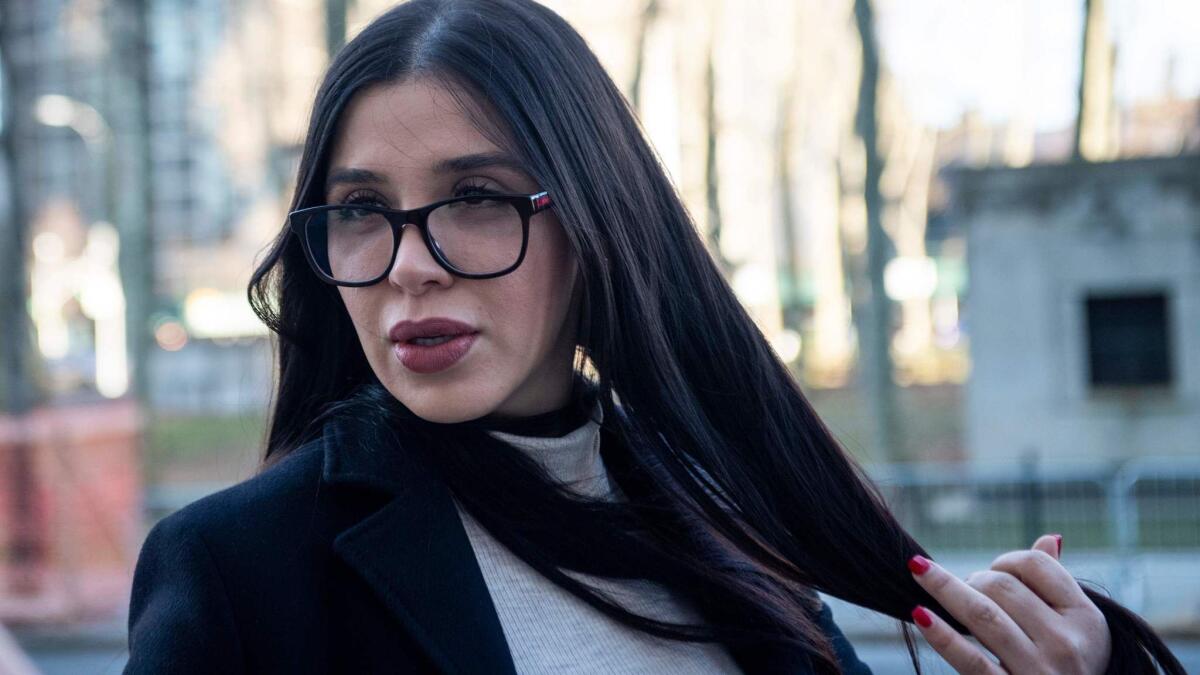‘El Chapo’s’ text messages to his wife — and purported mistress — revealed in court

- Share via
Reporting from New York — The prosecution’s recipe for Joaquin “El Chapo” Guzman’s downfall was on full display in federal court Wednesday: turncoats, technology — and the notorious drug kingpin’s own paranoia.
The FBI was able to tap into scores of text messages that Guzman, 61, sent in 2012 because the infamous Mexican drug lord had installed spyware on the phones of his wife, associates and a purported mistress. FBI Agent Steven Marston told jurors in Guzman’s trial that the agency obtained warrants to intercept the messages, which offer scintillating evidence of Guzman’s leadership of the multibillion-dollar Sinaloa cartel.
The other key to the agency’s plan: turning the cartel’s technology guru, Cristian Rodriguez, into an FBI informant. Rodriguez had created the cartel’s encrypted communications system, and also installed the spyware for Guzman. For a payment of $460,000 and an offer of protection, Rodriguez unlocked the cartel’s encryption for the U.S. government from 2011 to 2013, Marston testified.
Marston spent hours Wednesday reading intimate texts between Guzman and his wife, Emma Coronel Guzman, a 29-year-old former beauty queen, as well as texts between Guzman and a purported mistress.
Jurors heard personal back-and-forth messages between the married couple, including Guzman saying of their 6-month-old daughter, one of their twins: “Our Kiki is fearless. I’m going to give her an AK-47 so she can hang with me.” They also learned that Emma Guzman referred to her husband as “Don Joaquin,” “Mr. Joaquin” and “Papi,” while he called her “love,” “darling” and “queen.” But the texts also laid out details of the drug leader’s cartel life as a wanted man.
He talks about barely escaping a police raid on his Los Cabos, Mexico, home in 2012 and asks Emma to get pants (size 32/30), shoes (Mexican size 7) and black mustache dye.
“I saw them pounding on the door next door, but I was able to jump out,” he wrote to his wife, who married Guzman when she was 18.
“Oh, love. That’s horrible,” she responded. “I’ll be watching the news to see what they say, love.”
He also talks to her about making sure she has a gun, and when she sees there are cars outside her home, in 2012, he says: “You go ahead and lead a normal life — they just want to see if you’re coming to where I am.”
Most damning were numerous messages to and from Augustina Cabanillas Acosta, whom Guzman refers to as “love.” In an intercepted message between Acosta and another person, prosecutors said, Acosta says she knows Guzman is spying on her — yet she continues to use her phone to coordinate drug deals.
Emma Guzman sat expressionless in the court as the text exchanges were read.
In one message, Acosta talks to Guzman about arranging a boat to pick up kilos of cocaine off the California coast near Los Angeles. In another exchange, they speak of a 550-kilo marijuana boat delivery there that went awry. In January 2012, three delivery men were caught and Guzman offers the name of a public defender who might represent the men — and asks Acosta to try to find out what’s going on in their case.
Acosta, who was arrested in the 2012 Los Cabos drug raid, tells him the public defender “doesn’t want to cooperate.”
The sweeping trafficking case against Guzman, who’s accused of smuggling tons of narcotics and weapons — as well as involvement in drug wars and the widespread corruption of Mexican officials — is likely to last another month.
Rodriguez, the cartel’s technology guru, gave eye-opening testimony about the depth of Guzman’s love for spying on his inner circle. In 2008, at the age of 21, Rodriguez — a Colombian tech expert who said he dropped out of college to “start his own business” — began developing encrypted communications systems for one of the world’s most powerful drug cartels. Guzman paid $100,000 in cash for the system. It was so good that the FBI couldn’t crack it, until Rodriguez helped them do it as an informant.
Though Rodriguez said Guzman told him he liked the system, which allowed for fully protected calls via the Internet, Guzman’s obsession was the spyware he had installed on the cellphones of 50 people in his inner circle, including his wife. He called the spyware — which allowed him to see text message and emails, listen to calls and track locations from each phone — his “toy,” Rodriguez testified.
Guzman’s favorite spyware feature was the ability to tap into microphones on phones, Rodriguez said. Guzman would call people on the encrypted communications system, then tap into the mike on their cellphones to see what they said about him when they were done talking.
Guzman even had one of his workers keep track of the 50 phones the spyware was installed on, giving him daily reports on the texts, phone calls and whereabouts of those he was tapping.
Eventually, Rodriguez said, Guzman asked whether he could install the spyware on someone’s computer, or “make it special,” as Guzman called it.
“He asked how long it would take,” Rodriguez testified. “I said three minutes.”
Guzman said he would distract his female companion at the time, and told Rodriguez to do it.
Guzman also had special instructions for the man chosen to keep tabs on the spyware activity by listening to phone calls with headphones on.
“El Chapo told him to say, if asked, that he was listening to music — what he was doing was listening to phone calls,” Rodriguez testified.
He said the man described Guzman’s listening habit to him as: “El señor needs his fix.”
Rodriguez’s testimony is expected to continue Thursday.
Plagianos is a special correspondent.
More to Read
Sign up for Essential California
The most important California stories and recommendations in your inbox every morning.
You may occasionally receive promotional content from the Los Angeles Times.













